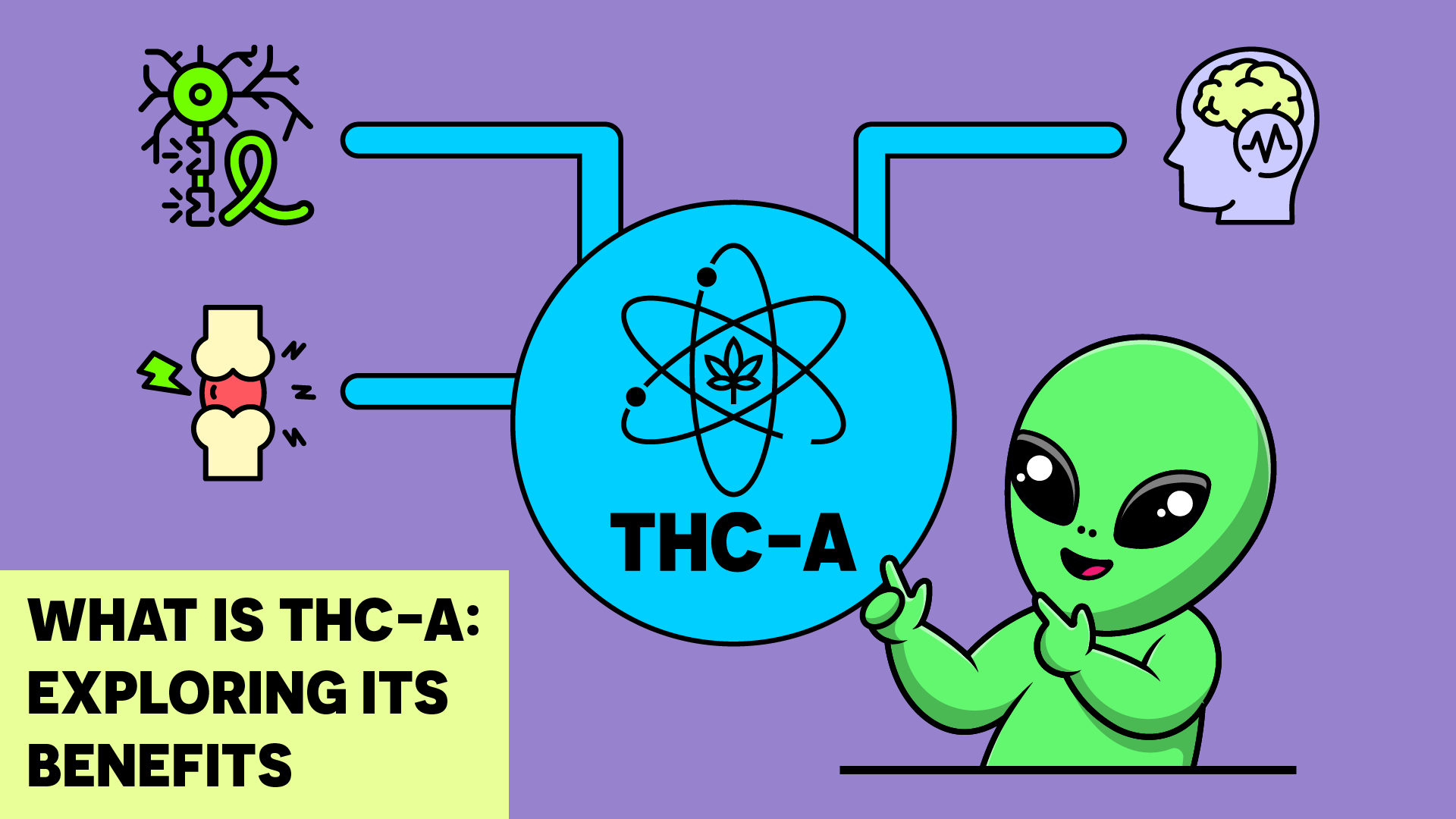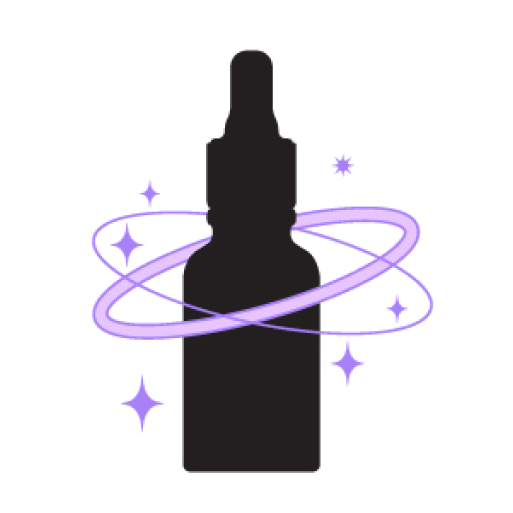What is THC-A: Exploring Its Benefits

Table of Contents
- What is THC-A in Reality?
- What Does THC-A Do?
- The THC-A Health Benefits Explained
- The Variety of THC-A-Infused Products
- Trusted Sources of THC-A
- Final Thoughts
- FAQ
In the dynamic realm of medical plant exploration, there’s a standout compound capturing attention for its suggested therapeutic qualities: THC-A. This article is your guide into the intricate world of THC-A, where we’ll explore its quality, distinctions from THC, potential medical applications, functions, health advantages, consumption methods, and trusted sources. Embark on this insightful exploration, where THC-A stands as a beacon of potential in the diverse landscape of cannabis-derived therapies.

What is THC-A in Reality?
As you navigate the fascinating world of cannabis compounds, it’s essential to understand what is THC-A and the potential THC-A benefits. The renowned psychoactive element in cannabis—THC-A boasts a non-psychoactive nature, ensuring it won’t induce the familiar euphoric “high” commonly linked with the use of other variants like Delta 9. The metamorphosis of THC-A into Delta 9 THC occurs through the crucial process of decarboxylation, often catalyzed by heat. This transformative mechanism involves the removal of a carboxyl group from THC-A, resulting in the conversion of THC-A into Delta 9 THC. Understanding this intricate process sheds light on the dynamic nature of cannabis compounds and the crucial role of decarboxylation in unlocking their full potential. The suggested benefits of THC-A include:
- Non-psychoactive nature
- Precursor to THC
- Distinct from THC
- Promising therapeutic potential
You may find it intriguing that despite its non-psychoactive nature, it is still suggested that THC-A holds significant therapeutic promise. This quality has sparked intense research, exploring its potential applications in various medical conditions. This unique compound paves the way for innovative cannabis-derived treatments, offering a pathway distinct from the traditional psychotropic effects associated with THC.
Quality of THC-A Explored
The assessment of THC-A quality delves into various factors, including cultivation and processing techniques. The therapeutic potential of the THC-A structure hinges on maintaining optimal purity and potency, achieved through meticulous cultivation, extraction, and purification processes. According to USDA THC-A, THC-A testing must be done following strict rules and regulations. And understanding the nuances of these processes is vital for discerning consumers seeking the highest quality THC-A products.
- Purity and potency considerations
- Meticulous cultivation practices
- Impact of extraction methods
- Significance of purification processes
When navigating the landscape of THC-A quality, it’s essential to grasp the interplay between cultivation and processing. Purity and potency considerations are not mere technicalities but integral aspects ensuring the efficacy of THC-A. The meticulous cultivation practices, combined with precise extraction and purification, underscore the commitment to delivering a product that retains its therapeutic potential.
What Sets THC-A Apart?
As we delve into the molecular structure of THC-A intriguing distinctions emerge regarding its effects on the body. Just like Delta 8 products THC-A’s nature sets it apart, making it a compelling option for individuals seeking cannabis-related health benefits without certain effects commonly associated with other forms of the plant. Some noteworthy attributes believed to be associated with THC-A include:
- Non-psychoactive nature
- Unique molecular structure
- Health-focused appeal
- Potential for therapeutic use
Exploring the molecular nuances in THC-A unveils the diverse potential within cannabis compounds. The non-psychoactive feature of THC-A isn’t merely a difference; it becomes a health-focused advantage. This unique molecular structure positions THC-A as an exciting prospect for those emphasizing therapeutic benefits without specific effects linked to cannabis use.

Potential Applications in Various Medical Conditions
In the exploration of THC-A’s potential medical applications, a panorama of possibilities emerges, highlighting its anti-inflammatory, neuroprotective, and antiemetic properties. These attributes position THC-A as a potential remedy for an array of conditions, from chronic pain and neurodegenerative disorders to alleviating nausea induced by chemotherapy.
- Anti-inflammatory properties
- Neuroprotective effects
- Antiemetic potential
- Applicability in chronic conditions
Consider the potential impact of THC-A in addressing chronic pain, neurodegenerative disorders, and chemotherapy-induced nausea. Its anti-inflammatory prowess, neuroprotective qualities, and antiemetic potential open doors for alternative treatments. As the medical landscape evolves, THC-A stands at the forefront, offering a multifaceted approach to cannabis-derived therapeutic solutions.
What Does THC-A Do?
The THC-A effects are truly something else. What THC-A accomplishes within your body is an engaging exploration into the intricate web of the endocannabinoid system (ECS), a sophisticated network of receptors overseeing various physiological processes. While the exact mechanisms are a topic of ongoing study, the exciting premise lies in THC-A’s believed modulation of the ECS.
Picture this: THC-A as a potential orchestrator, influencing how your body perceives pain, manages inflammation, and regulates mood. It’s akin to uncovering the conductor of a symphony—THC-A, orchestrating the harmony within your ECS, revealing a potential key player in the intricate dance of physiological balance.
The THC-A Health Benefits Explained
So what are the THC-A health benefits? Exploring the potential THC-A health benefits opens a window to a diverse landscape, though it’s crucial to note that these assumed benefits are not universally confirmed. Emerging studies tentatively suggest that THC-A might hold promise in alleviating symptoms linked to conditions such as arthritis, multiple sclerosis, and epilepsy. While these assumptions pave the way for exciting possibilities, it’s essential to approach them with a tempered curiosity, acknowledging the evolving nature of cannabis research and its potential applications in the realm of health.
Arthritis Relief
Arthritis is characterized by inflammation in the joints, leading to pain, stiffness, and reduced mobility. THC-A possesses non-psychoactive properties, meaning it doesn’t induce any intoxicating effects. Instead, the focuses on the potential impact on inflammation, a hallmark feature of arthritis. So THC-A might offer relief for arthritis symptoms. Rooted in its perceived anti-inflammatory properties, there’s hope for reduced pain and enhanced well-being among arthritis sufferers. But it’s also crucial to recognize the evolving nature of cannabis research. The ongoing journey to confirm these benefits sheds light on the dynamic landscape in which THC-A’s role in addressing arthritis-related challenges is continually unfolding.
Multiple Sclerosis Support
Exploring the landscape of THC-A health benefits, there’s a tentative indication that it could play a role in alleviating symptoms associated with multiple sclerosis. Early studies suggest potential contributions to symptom management, sparking excitement in the medical community. However, recognizing the fluid nature of the field is crucial, as researchers are continually advancing their understanding. It is paramount to acknowledge the persistent pursuit of concrete evidence, especially when considering the implications of THC-A in the context of multiple sclerosis.
Epilepsy Management
One potential mechanism through which THC-A may exert its effects in epilepsy management is by interacting with the endocannabinoid system. The ECS plays a crucial role in regulating various physiological processes, including mood, sleep, and, importantly, neuronal excitability. Some studies suggest that THC-A may modulate the ECS, influencing the balance of neurotransmitters and potentially reducing the hyperexcitability of neurons that contribute to seizures.
Moreover, THC-A is known for its anti-inflammatory and neuroprotective properties. In epilepsy, inflammation, and oxidative stress can contribute to neuronal damage and increased susceptibility to seizures. THC-A’s potential anti-inflammatory effects could help mitigate these processes, providing a neuroprotective environment that may contribute to better seizure control.
The Variety of THC-A-Infused Products
The world of THC-A products has blossomed into a captivating array, offering enthusiasts a plethora of options to explore and incorporate into their daily lives. This diverse selection now spans well beyond the conventional choices, venturing into the realms of tinctures, capsules, topicals, and even beverages. Imagine tailoring your THC-A experience to match your unique preferences—whether you prefer the discreet convenience of capsules or the localized effects of topicals, the possibilities are expansive. This abundance empowers you, the consumer, with the freedom to curate a cannabis experience that seamlessly integrates into your wellness routine, aligning with your lifestyle and preferences.

Trusted Sources of THC-A
Now, as the popularity of THC-A continues its upward trajectory, the significance of sourcing from reputable providers cannot be overstated. You, the discerning consumer, play a pivotal role in ensuring the quality and integrity of THC-A products. It goes beyond just availability; it’s about choosing a brand that stands as a beacon of trust. Elyxr.com is a noteworthy example, earning its reputation as a trusted source for THC-A products. Recognized by many for its commitment to quality, transparency in cultivation and processing methods, and unwavering adherence to legal and safety standards, Elyxr wholesale opportunities exemplify the benchmark of reliability in the burgeoning world of THC-A consumption. As you embark on your journey with THC-A, the choice of a trusted source becomes your compass, guiding you through the vibrant landscape of cannabis-infused products.

Final Thoughts
Embracing THC-A as a wellness trend is not just about following the crowd—it’s about placing trust in a promising avenue for potential health benefits. The growing popularity of THC-A reflects a collective acknowledgment of its unique attributes, and trusted sources like Elyxr.com exemplify reliability in delivering quality products. By aligning with this trend, you’re not just following; you’re participating in a movement towards holistic well-being and exploring a trusted path in the evolving world of cannabis trends.
FAQ
Is THC-A as powerful as THC?
THC-A benefits are indeed remarkable. THC-A, although less potent than THC, presents distinctive qualities such as potential anti-inflammatory and neuroprotective effects. This renders THC-A a compelling choice for individuals seeking therapeutic benefits without the typical euphoria associated with THC. Exploring the nuanced spectrum of cannabis compounds provides you with a diverse range of options, each tailored to your specific preferences and health goals.
Is THC-A considered to be indica or sativa?
THC-A doesn’t neatly align with the indica or sativa categorization due to its absence of psychoactive elements that define these classifications. Its non-psychoactive nature grants you the opportunity to explore potential health benefits without the characteristic energizing effects associated with indica or sativa strains. Embracing the versatility of THC-A opens doors to a more personalized and nuanced cannabis experience, emphasizing well-being over traditional psychoactive effects.
How strong is THC-A and how does THC-A affect the brain?
THC-A’s strength lies in its non-psychotropic characteristics, offering a nuanced approach to cannabis consumption. The non-psychoactive nature of THC-A means its impact on the brain is primarily focused on modulating physiological processes without inducing alterations in cognitive function. This unique attribute positions THC-A as a promising avenue for individuals prioritizing the therapeutic aspects of cannabis without the traditional cognitive effects.











